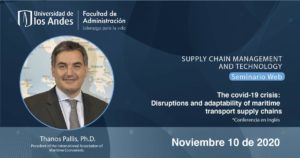Economic shocks test the resilience and adaptability of the maritime supply chains, with every new crisis triggering different ramifications. The seminar will focus on the temporal and spatial sequences of the supply and demand shocks of COVID-19 on shipping, ports, and related supply chains.
The COVID-19 crisis and the distributions and adaptability of maritime transport supply chains is the theme of the Supply Chain and Technology Seminar (webinar) of the Universidad De Los Andes Facultad de Administracion to be held on November 10, 2020
Benefited by work in progress for the United Nations – UNCTAD project on the resilience of maritime supply chains, the International Association of Ports & Harbors (IAPH) barometer on the impact of COVID-19 crisis on maritime transport, and recent scholarly work, the seminar will revolve around several inter-related domains: impacts on global supply chains; impacts on operational aspects, market structure, and strategic behavior of shipping lines and terminal operators; impacts on port activity levels in terms of vessel calls and container volumes ha
ndled; and network impacts in terms of changes in aspects of container port connectivity.
PortEconomics co-director Thanos Pallis will present the short-term impacts and their variations, and the evolution in the adaptive capacity and resilience of ports, terminal operators, carriers, and landside operations. Among others, his presentation will also underline that for an external shock such as COVID-19, its impacts are the outcome of how ports and the shipping industry fit within complex supply chains and the cargo composition handled by ports.
Participation is free. To join us (November 10, 2020; 08.00 Bogotá, Colombia, 14.00 CET), please register under the following link



![[Webinar] The COVID-19 crisis: distributions and adaptability of maritime transport supply chains](https://www.porteconomics.eu/wp-content/uploads/2020/11/SCM-Serie-de-Seminarios-Thanos-Pallis-04-1-scaled-1170x480.jpg)









